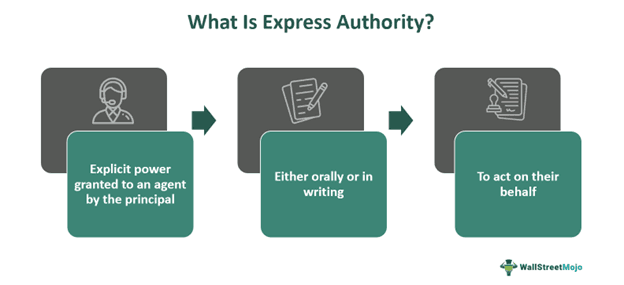Table of Contents
Key Takeaways
- Express authority involves explicit and unequivocal authorization given by a principal to an agent, either in written or verbal form, clearly defining the agent's duties and responsibilities.
- This type of authority establishes a transparent framework that minimizes ambiguity, ensuring both the principal and the agent have a mutual understanding of the agent's role, leading to legally binding actions.
- While express authority is direct and clearly communicated by the principal, implied authority arises from the circumstances that necessitate specific tasks,
- and apparent authority is based on the reasonable belief of third parties that the agent has the power to act on the principal's behalf.
Examples
Let us look at some examples to understand the concept better.
Example #1
Consider a hypothetical scenario involving an insurance agency and an agent named John. The insurance company explicitly grants John express authority to find and solicit new clients for life insurance policies.
John's primary duty is to seek out potential clients and successfully sell them life insurance policies. However, the express authority agreement only outlines some specific tasks or actions that John can take to find these clients.
Given the nature of his role, John has implied authority to perform actions that are both incidental and necessary to accomplish his primary objective of securing new life insurance clients. This implies that he can use the company's branded car, wear the company's uniform, display the company's logo, and engage in activities that facilitate the process of identifying and contracting with new clients for life insurance policies.
Example #2
Let's consider the case of Emily, who is hired as a marketing manager by a marketing agency. Her employment agreement specifies her duties and responsibilities, which represent her express authority within the agency.
Emily's duties, as outlined in the employment agreement, may include:
- Creating marketing campaigns.
- Managing client accounts.
- Overseeing a team of marketing professionals.
- Presenting marketing strategies to clients.
So, in this scenario, the employment agreement defines Emily's roles and responsibilities, serving as her express authority to act in the capacity of a marketing manager within the agency. It provides a clear framework for what she is authorized to do in her role while working for the company.

